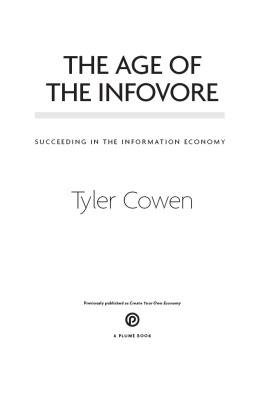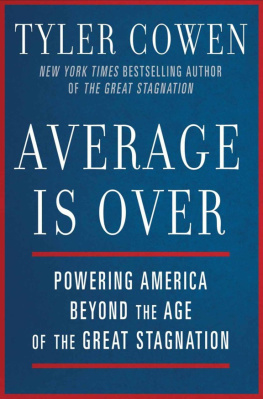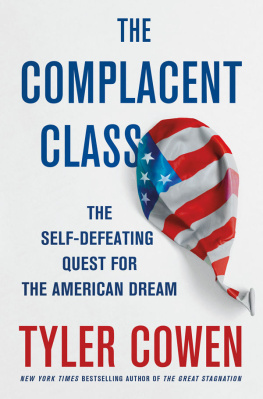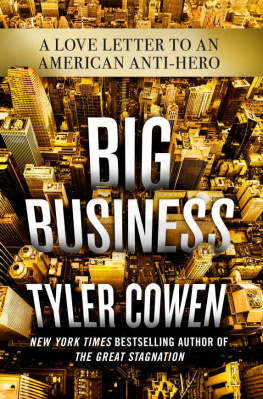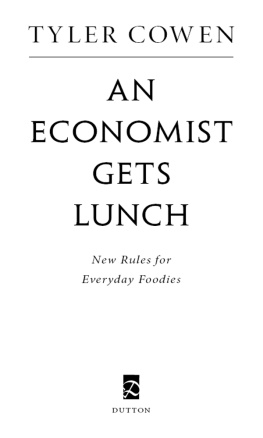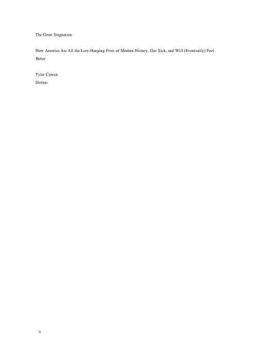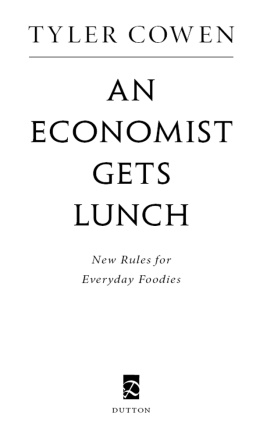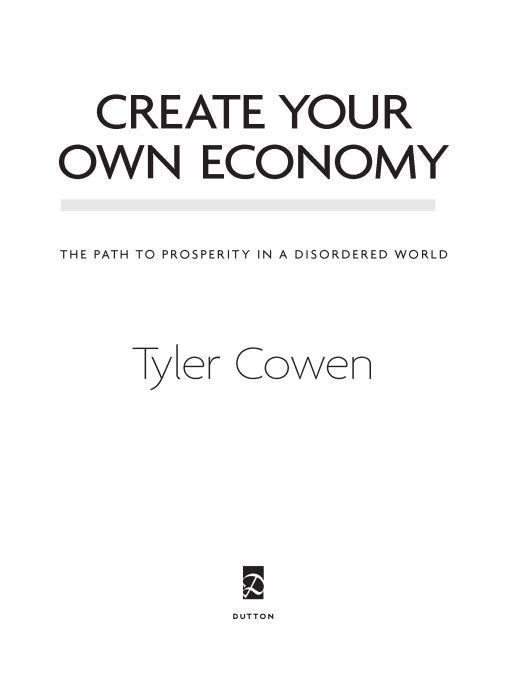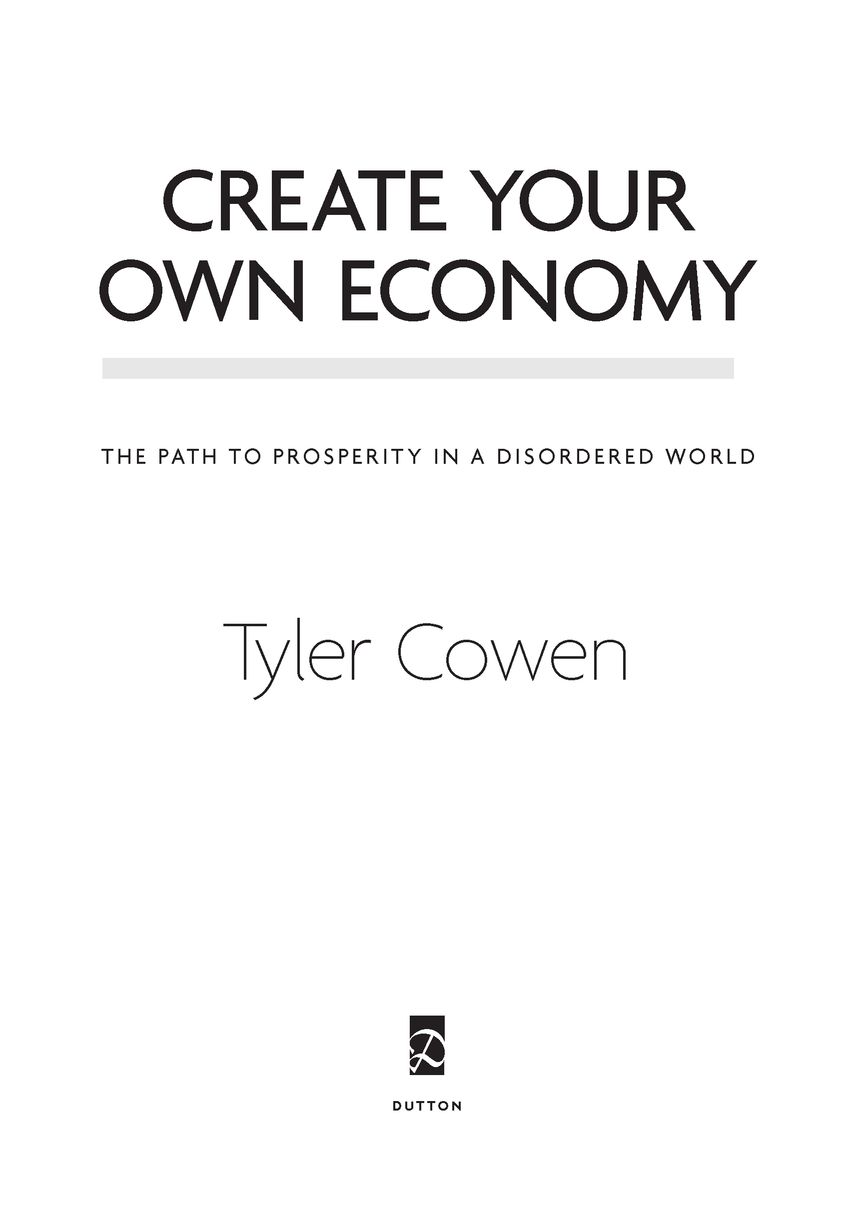Table of Contents
ALSO BY TYLER COWEN
Discover Your Inner Economist
PREFACE
The content of this book has a special meaning for the bad economic times that we are experiencing. I view the book and its message as a path to a better life and it is a path that is especially important today.
When the economy is doing poorly, people cocoon and turn to less expensive pleasures. During the Great Depression of the 1930s, people cut back on the expensive evening out and looked to board games, radio, and family entertainment at home. People learned how to do more with less and those tendencies shaped American life for decades. The Great Depression wasnt just an economic event; it was also a cultural shift. And there is another cultural shift going on right now. In down times people exercise more, eat out less and cook more, and engage in more projects for self-improvement and self-education. Usage at public libraries is up and people are spending more time on the internet; once youve paid for your connection most of the surfing is free. These trends are more important than most of us realize and in this book I will tell you why. I will tell you why they are not just short-run trends but why they presage something much deeper about our future.
The challenge is this: As the recession has come, rather than surrendering, what can we do to empower ourselves and create a better life? What technologies can we use and how? To whom should we look as the new role models and the new heroes? How can we turn inward and improve who we are and how we organize our internal personal worlds?
This book is about the power of the individual to make a difference and also to change an entire world, whether or not the supposed economic forces are on your side. Thats what I mean by create your own economy.
If youd like to learn more, please turn the page.
What lies behind us and what lies ahead of us are tiny matters compared to what lives within us.
UNKNOWN SOURCE
THE FUTURE OF THINKING DIFFERENTLY
This book will start and end with the idea of the value and the creative power of the individual. This is the ultimate driver of prosperity in the modern world; it is the power that can get you the best things in life. Our tour in the middle will visit society, technology, politics, economics, culture, and the internet, but the first step on this journey will be one of self-discovery.
One day, about five years ago, something strange happened. One of my blog readers at www.marginalrevolution.comher name is Kathleen Fasanellawrote me and asked me very politely and very intelligently to consider if I might be described by either Aspergers syndrome or high-functioning autism. She thought I was, just from reading my writing, and she considered herself an Aspie, the current shorthand for Aspergers syndrome. In her email she pointed out that I keep quite a bit of information in my head in a highly ordered fashion and that I have a command of many small facts in my areas of interest, namely culture and the social sciences. Apparently that was enough to set off her radar.
Now, I receive all sorts of email, so this didnt sink in immediately. At first I found it vaguely insulting, a bit like the crank emails I receive with conspiracy theories about the Federal Reserve System. But I investigated the question further and the more I read about the phenomenon, the more I saw that, while I do not fit the typical public conception of an autistic or suffer from low social intelligence, I have many of the cognitive strengths and weaknesses of autism. In other words, I have an autistic cognitive style. Ive since come to believe that this is a common cognitive pattern, including among some very successful people.
At the time I was very surprised by Kathleens message. I was a forty-one-year-old upper-middle-class white male who all his life felt like he belonged to the dominant group in American society. Suddenly I was faced with the suggestion that I could be part of a minority, and a very beleaguered minority at that. I have since become comfortable with my affiliation with autism, and indeed proud of it, but its not a thought I was ready for at the time.
One strong feature of autism is the tendency of autistics to impose additional structure on information by the acts of arranging, organizing, classifying, collecting, memorizing, categorizing, and listing. Autistics are information lovers to an extreme degree and they are the people who engage with information most passionately. When it comes to their areas of interest, autistics are the true infovores, as I will call them. Autistics are sometimes portrayed as soulless zombies, but in fact they are the ones with the strongest interest in human codes of meaning. Joy, passion, and autism are probably not three words you are used to finding together but they are often a close fit.
We all have our particular areas that we know very, very well is what one autistic person said to me, and he did not have an advanced degree. Often autistics seek out work that satisfies their passion for information, whether it involves designing new software for a library, conducting a scientific experiment, or ordering ideas in the form of a book or a blog. Mark Donohoo, an autistic, spends a lot of his time studying the statistics of the Atlanta Braves and collecting baseball literature. Or to consider one more stereotypical case, Ethan, an autistic boy in kindergarten, was fascinated with railway schedules and read the schedules all day long online, at least until his mother restricted his hobby. The Metro-North was his favorite train to follow.
The notion of ordering information may sound a little dry, but it is a joy in our everyday lives, whether you are autistic or not. It should be familiar to anyone who has enjoyed alphabetizing books on a shelf, arranging photos in an album, finishing a crossword puzzle, or just tidying up a room. Its not that anyone sits down and says I want to do some ordering now, but rather we are interested in specific features of our world. We have become infovores to help make the world real and salient for us. Ordering and manipulating information is useful, fun, alternately intense and calming, and it helps us plumb the philosophic depths. We are entering a world where the collection and ordering of information has reached baroque, extravagant extremes, and that is (mostly) a good thing. It is a path toward many of the best rewards in life and a path toward creating your own economy and taking control of your own education and entertainment.
As I read more, I began to see that the autistic mind-set about engaging with information is a powerful way to understand the whole world around us. Especially now.
Coping with information involves both cognition and overt behavior. Most of us cant keep track of everything in our minds, so we call upon technology to help us, or as economists would say, we use capital goods. Because of the web, mental ordering has become very cheap and effective and thus it has become a very powerful social force.
Consider the rise in popularity of the iPod or the music-playing iPhone. Compact discs have become secondary and at least in the United States most music is now played on computers and computer-like devices. Having passed Wal-Mart in 2008, iTunes is now the biggest American music retailer. A 2008 survey showed that, when it comes to music, most young people dont think anymore about buying compact discs. My nineteen-year-old stepdaughter, Yana, listens to almost all her music on her computer or her iPod. Her first year in college has come to a close, but to my initial horror it has yet to occur to her that she needs a stereo in her dorm room. The reality is that she has far more control over her musical life than I did at the same age, far more choice, and greater ease of access.


